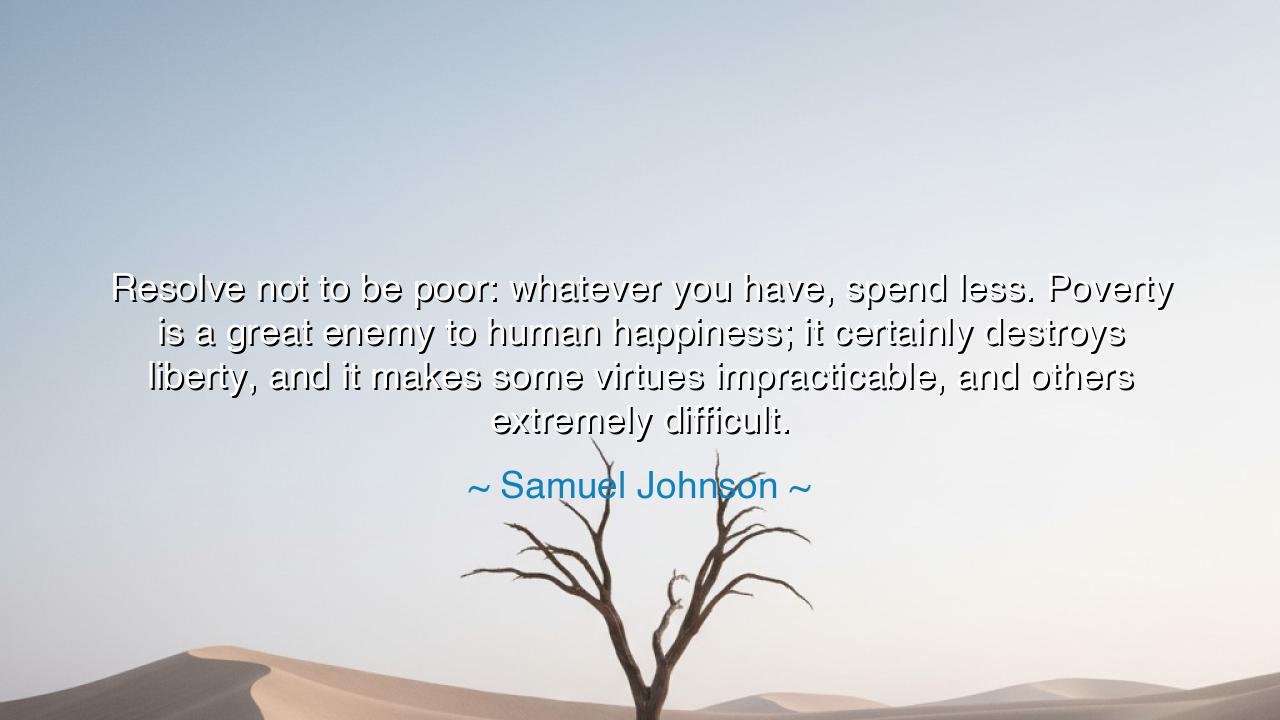
Resolve not to be poor: whatever you have, spend less. Poverty is
Resolve not to be poor: whatever you have, spend less. Poverty is a great enemy to human happiness; it certainly destroys liberty, and it makes some virtues impracticable, and others extremely difficult.






“Resolve not to be poor: whatever you have, spend less. Poverty is a great enemy to human happiness; it certainly destroys liberty, and it makes some virtues impracticable, and others extremely difficult.”
Thus spoke Samuel Johnson, the great English moralist and sage of the eighteenth century, whose pen carved truths into the heart of human experience. In these powerful words, he lays bare the timeless wisdom of moderation, foresight, and self-discipline. Johnson does not scorn the poor — rather, he warns of the spiritual and moral dangers that come when one surrenders control over one’s means, when appetite devours prudence, and when dependence replaces freedom. To “resolve not to be poor” is not to worship wealth, but to guard the dignity, liberty, and peace of the soul.
The origin of this saying arises from Johnson’s deep observation of the human condition. He was himself no stranger to hardship. In his youth, he struggled with poverty, illness, and rejection, walking the streets of London half-starved, yet rich in mind and determination. From those years of suffering, he came to understand that poverty—while sometimes noble in endurance—often crushes the spirit, forcing the virtuous to compromise and the wise to bow before necessity. He saw how want could make the honest man servile and the free man dependent. Thus he resolved to teach others what he had learned by fire: that the surest safeguard of liberty is the mastery of one’s own desires, and that true wealth begins not in abundance, but in prudence.
Johnson’s exhortation begins with a command that is both moral and practical: “Spend less.” These two words contain an entire philosophy of life. They remind us that happiness is not found in possession, but in proportion — not in how much we own, but in how wisely we live. To spend beyond one’s means is to build one’s house upon sand, to invite anxiety and servitude into one’s soul. For debt is a chain as real as iron; it makes a man’s will no longer his own. The borrower becomes, as the ancients said, the slave of the lender. Thus, in Johnson’s view, the discipline of thrift is not mere economy — it is the practice of freedom.
Consider the example of Benjamin Franklin, a man of the same age and spirit as Johnson. Franklin, born in poverty, rose to wealth not through inheritance or chance, but through moderation and foresight. His words echoed Johnson’s own: “A small leak will sink a great ship.” Through prudence, labor, and restraint, Franklin gained not only prosperity, but independence — and with independence, the liberty to think, to act, and to serve. Had he lived recklessly, he would have been no philosopher, no statesman, but another beggar upon the road of life. In his story, we see Johnson’s warning made flesh: poverty destroys liberty, for the man who must beg cannot speak boldly, cannot act justly, cannot stand upright in the world.
But Johnson’s wisdom goes deeper still. He warns that poverty makes some virtues impracticable, and others extremely difficult. Charity becomes impossible to the one who has nothing to give; honesty becomes perilous when hunger presses close; patience grows hard when tomorrow brings uncertainty. Though virtue is of the soul, it breathes best in the air of security. The man forever in want is tempted daily to compromise his conscience — to flatter the powerful, to deceive the creditor, to submit where he would otherwise stand firm. Thus, Johnson’s counsel is not against virtue, but for its protection. By living within our means, by mastering desire, we preserve the soil in which virtue can grow.
And yet, his teaching is not one of greed or hoarding. To “resolve not to be poor” is not to clutch wealth in fear, but to live with balance and self-command. It is to recognize that money, though small in comparison to wisdom or faith, is still the instrument by which liberty is maintained and good deeds are made possible. The wise man neither worships gold nor despises it; he uses it rightly, as a tool for service and stability. Johnson, who gave freely to the poor even when he himself lacked plenty, knew that the true enemy was not want itself, but waste — not poverty of possessions, but poverty of discipline.
So, my child, take this teaching to heart. Resolve not to be poor, not through greed, but through wisdom. Guard your resources as you would guard your honor. Let your desires be fewer than your means, and your gratitude greater than your wealth. Save before you spend; give before you boast. For the man who governs his purse governs his destiny, while the one who yields to appetite becomes a captive to his own cravings. Remember always: the virtue of thrift is not stinginess, but stewardship — the art of living freely and generously without falling into chains.
And in this way, you shall know the truth of Johnson’s words: that the mastery of one’s means is the mastery of one’s fate. Poverty, when chosen or endured with dignity, may still nourish greatness — but poverty born of folly, of waste and indulgence, is the enemy of both liberty and happiness. Therefore, be humble, be prudent, and be free. For the one who learns to spend less than he earns will always walk in peace, and no tyrant, nor debt, nor fear, shall ever make him bow.






AAdministratorAdministrator
Welcome, honored guests. Please leave a comment, we will respond soon